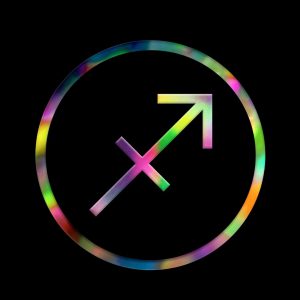Montréal’s DJ Killa-Jewel – who many Québecois discovered this year as the house DJ for the TV rap talent show La fin des faibles – has renewed her musical approach on Sagittarius. The four-song EP is her very first release on a record label, namely Hydrophonick Records, the hip-hop branch of Indica Records.
Her previous project Reckless, released independently last year, featured the talents of several rappers (Wasiu and Nate Husser in particular), but Sagittarius is a “true” solo project, on which Killa-Jewel’s music lives on its own terms. Only one of the tracks – the bona fide earworm Without You – uses a non-sampled voice: her own. “Producing music with the intention of collaborating with a rapper or singer is very different from composing instrumental music,” she says. “It led me to create a more dynamic style of music whose goal is to entertain and engage the audience. This translates into a much broader creative freedom.”
With its trip-hop and techno influences, its soaring sounds, and its references to astrology, Sagittarius offers a rather unique astral trap signature. Killa-Jewel’s scratching parsimoniously peppers her amalgamation of sounds and styles. “I wasn’t even sure I would scratch over those songs,”: she says. “I didn’t know if scratching was still relevant in 2021. But they [the Hydrophonik people] said I absolutely had to include some scratching, because it’s my signature. They offered me a great opportunity to marry my original style and my new direction.”
In addition to embodying the celestial mood of the project, the title of the EP represents the zodiac sign and personality of the DJ, producer, and singer-songwriter, who turned 42 in November. “A Sagittarius is someone who loves their freedom,” she says. “It’s a sign associated with passionate people who like to take risks and who want to live their lives to the fullest. That’s exactly how I live my life. It’s been a wild ride!”
 With her head in the stars since childhood, this Star Trek ultra-fan got her start as a DJ in the mid-‘90s. “My first boyfriend taught me the basics of DJ-ing when I was in high school,” she says. “We’d spend hours every day playing and mixing records on his turntables. Then we started playing at house parties. Music was my drug.”
With her head in the stars since childhood, this Star Trek ultra-fan got her start as a DJ in the mid-‘90s. “My first boyfriend taught me the basics of DJ-ing when I was in high school,” she says. “We’d spend hours every day playing and mixing records on his turntables. Then we started playing at house parties. Music was my drug.”
A few years later, a phone call changed her life: it was DJ Qbert, the American master turntablist. “I was still living at my mom’s when I got that phone call, says Killa-Jewel. “The person on the other end said: ‘Hi! It’s Q!’ I was speechless. I asked him how he got my number and he said, ‘I just heard of you.’ He explained that he was producing a tutorial DVD on the various scratch techniques, and that he was looking for up-and-coming DJs willing to participate in the production. He asked me to scratch for him right there on the phone, just to make sure I was good enough. In the end, he just said, ‘OK, it’s perfect! Send me a video and I’ll include it on the DVD!’”
The DJ then shared the stage with Qbert a few times, including alongside MixMasterMike (another turntable legend) during the X Games extreme sports competition a few years ago.
On a local level, however, it was her early encounter with another renowned artist that was pivotal: Robert Lepage. In the 2000s, the playwright and stage director tapped Killa-Jewel for his plays Zulu Time and The Busker’s Opera, experiments that went far beyond music.
“When you work with Robert, you have to expect that he’ll use everyone’s talents in different ways,” she says. “For The Busker’s Opera, he made me sing opera, play a role, play the piano, and scratch, too. It was a golden opportunity for me… And now when I’m onstage, I try to think out of the box, like Robert does. It makes me strive to make my shows as dynamic as possible. I do live-looping, I sing, I play the piano, I scratch… It’s a real one-woman show.”
Killa-Jewel’s experience alongside Lepage also allowed her to discover the world. Released in 2014, her debut album Saudade is the result of a crate-digging quest that took place mostly during her theatrical tours. “Saudade is made with sounds that I found along the way,” she says. “It’s a travelogue. The problem was, there were just too many samples, and I just didn’t have the budget to clear all of them,” she adds, referencing the independent release, essentially limited to her website and Bandcamp page. “It was an important learning experience,” she says
And the learning hasn’t stopped over the last few years. Killa-Jewel switched from the MPC-2000 and samples, to Ableton Live and composing. “My productions definitely have a more electronic sound. It literally changed my style,” she says.
First hinted at on Reckless, her new style is confirmed on Sagittarius. And the new musical direction is matched by a similar one in her career – symbolized as much by being signed to Hydrophonik, as it is by her participation in La fin des faibles, the TV talent show whose second season was recently green-lit.
“When the pandemic started, I spent as much time as possible in the studio to really fine-tune my productions,” says Killa-Jewel. “I started shopping around for labels, and in the meantime, I got the call from Urbania [the production company of La fin des faibles]. It was an extraordinary and totally unexpected [case of] momentum. I’m unbelievably lucky.”
But it’s not just a question of chance… After all, Sagittarius is known for being extremely resourceful.